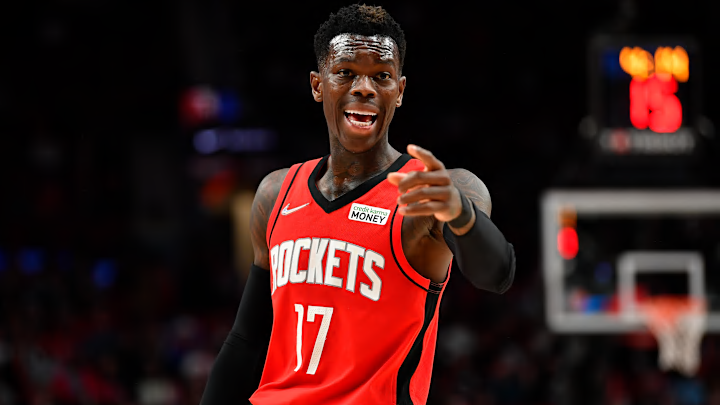When the Houston Rockets acquired Dennis Schroder at the February 10th trade deadline, it faced heavy scrutiny from fans and pundits alike. While the move did allow them to move off of Daniel Theis, it failed a key criteria. It did not open up more minutes for the team's young guards.
The Rockets' crowded room of talented youngsters includes Jalen Green, Kevin Porter Jr., and Josh Christopher. One of the primary goals of the deadline was to find more minutes for that young trio and create opportunities for center Alperen Sengun. Instead, it appeared that they had only solved the problem of how to get Sengun more court time.
However, across 15 games, Schroder flashed his talents. He averaged 10.9 points and 5.9 assists in 26.9 minutes per game and looked like a great complimentary piece alongside Jalen Green. When he was benched during the late season tank, Kevin Porter Jr. brilliantly stepped into place as a volume-heavy scorer and showed off a bevy of talent in terms of scoring the basketball.
Dennis Schroder had 22 potential assists last night, the highest mark of any Rocket this season.
— Itamar (@Itamar_17_10) February 17, 2022
That's just not something I remotely expected to see from him. Here the Rockets finally run the rare pick and roll, and he uses the threat of the mid range to assist Sengun inside. pic.twitter.com/ZQmU3GNNXj
Now, Houston is faced with an interesting dilemma. Do they let Schroder walk to create that previously desired playing time for their young guards? Or do they bring back the veteran German to provide a steady hand at the point? While their youthful backcourt is the future, there is also evidence that Houston should slow down with handing the keys to the kids too quickly.
Why the Rockets should retain Dennis Schroder
Retaining Schroder would allow him to play one of two key roles. For the bench unit, Schroder could serve as the most adept scorer and the veteran player responsible for shepherding all the youngsters that will likely see time as the 2022 Rockets continue their rebuild. On the flip side, should the team decide to utilize Kevin Porter Jr. as a sixth man, allowing him to score at will, Schroder could play an important role as the starting point guard.
Between Schroder and Sengun, Houston's ball movement has been excellent tonight. Wow.
— Kelly Iko (@KellyIkoNBA) March 10, 2022
Last week, Houston secured the third pick in the draft and, based on many mock drafts, the presence of Duke forward Paulo Banchero. Banchero, standing 6’10” and weighing 250 pounds, projects as a point-forward that could enter the NBA as an immediate high-level scorer.
Maintaining Schroder’s presence on the roster would present Green, Sengun, and potentially Banchero with an able passer to facilitate, while also taking easy buckets as defenses shift their attention towards the more talented younger scorers. A veteran presence amongst the young talent could shepherd their development without impeding their opportunity.
All of this comes, of course, with a large degree of uncertainty. Schroder ultimately played 2021 on a one-year deal due to his desire to return to the free-agent market in 2022. Houston may not be interested in committing the type of long-term money he'll want with their own young talent in hand. On the other hand, how interested will Schroder be in returning to another rebuilding year?
If things fall their way and the market for Schroder is dry, Houston bringing back #17 could be a smart move for the franchise. Youth is ultimately going to drive the rebuild, but retaining this talented veteran can only bring them more flexibility and experience moving forward. Plus, as the trade of Daniel Theis that brought Schoder to Houston in the first place can attest to, finding a new home for a quality veteran is always an option.
